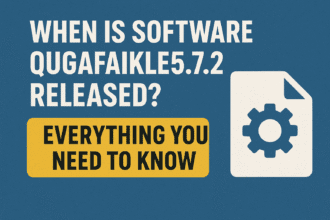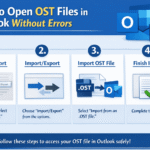Why is Hospital Management software important?
- 1 Factors that determine the importance of a hospital management system
- 1.1 Automated management:
- 1.2 Processing speed:
- 1.3 Reduction in avoidable errors:
- 1.4 Improved decision-making:
- 1.5 Improved patient experience:
- 1.6 Enhancing revenue management:
- 1.7 Seamless data tracking:
- 1.8 Data security:
- 2 Conclusion:
While working in a super busy workplace like a healthcare facility, you might have wished to add some automation to the administration system, which can ease the process and make it faster. Let’s discuss why Hospital Management software is important.
Healthcare is one of the most critical socio-economic sectors of any country. It defines the strength and position of a country in terms of successful strategies. Thus, it requires more efficient management and valuable tools to streamline the functioning of hospitals or healthcare facilities.
Hospitals are vital generators of information and revenue in the healthcare system.
Hospital management systems have been in the market for decades, and it has helped enhance the quality of life & patient care.
But today, with an immense increase in several new diseases emerging and the amount of new medical knowledge coming forth, we need a better and more systematic management system.
Factors that determine the importance of a hospital management system
Some of the most essential are listed below:
Automated management:
- Automated management of data and information does not mean storing and displaying data with a click. Still, it is about giving valuable insights that add value to patient care and effective management.
- The information must give practical insights into employee utilization, improved clinical decisions, room/bed occupancy rates, etc.
- The most fundamental goal of a helpful hospital management software is to manage and improve a patient’s complete journey in the hospital, no matter how many departments they have to visit or contact.
- It should calculate and display everything, from patient registration to discharge, in an organized way on one screen.
- Apart from this, the automated Hospital Information System should track accurate data of staff availability, operational information, and room occupancy, readily available at your fingerprints.
Processing speed:
- Every effective hospital management system is designed to avoid deviation in the operating procedures.
- Implementing hospital management software that is actively connected to all departments, such as laboratory, radiology, or other hospitals, helps provide real-time information on a patient’s health reports quickly.
- All this is considered a patient’s clinical data, which is extremely important when making the crucial decision for patient care.
- This can help employees be more accessible and improve their work with relevant data. The process becomes more efficient and speedy, wasting no time.
Reduction in avoidable errors:
- It has not been long since COVID-19 revealed some dark secrets and potholes in hospital management systems. Our manual systems lead to numerous deaths due to avoidable human errors.
- These errors can be avoided easily using more efficient and automated hospital management software.
- Today’s hospital management system is entirely automated, which gives accurate outcomes without human intervention. This reduces human errors, which can enhance patient care and management functioning.
Improved decision-making:
- Decision-making is a crucial part of patient care. It is vital to make decisions that are necessary, practical, reasonable, and suitable. The decision-making process encompasses a lot of information.
- Today’s modernized hospital management system has been developed more smartly. It encompasses information about the patient’s medical history and relevant data, which helps physicians with decision-making.
- The interoperability of hospital management systems is like a boon for healthcare as it will unfurl the patient’s information, which the patient might have forgotten. An efficient hospital management system with interoperability is a must in today’s world of digitization.
Improved patient experience:
- For better and faster clinical decisions, efficient and improved patient data is essential.
- Imagine the speed and efficiency of decision-making when the physician receives the radiology reports with a click in less than 10 minutes, just over a click-in system.
- Similarly, the patient care process can be improved easily by connecting multiple hospital departments to one master system, which provides doctors with real-time data with just one click.
Enhancing revenue management:
- Hospitals are an important socio-economic sector in our daily lives. They serve humanity by providing services to the unhealthy and simultaneously add value to the economy by generating revenue.
- Thus, revenue management is crucial to the healthcare sector in providing improved services.
- The new and completely automated hospital management systems provide rapid reports of transactions along with insights showing how well your business is doing.
- Today’s hospital management systems also enhance claim submission and reduce claim denials with accurate reports and records. You can easily count on the pending dues, interests, debts, invoices, etc.
Seamless data tracking:
- Information is among the top priorities regarding effective hospital management systems or software.
- The systems have enough potential to track the patient’s complete journey through the hospital, from registration to pharmacy bills and discharge.
- The hospital management software has numerous filters to filter out the patients and find critical data.
- For example, you can search for a patient’s name and get all the information or even filter them based on age if the names are similar.
- The HMS can also provide details about the medical staff and professionals working that same day in any department. It can provide information on staff shifts, temporary staff details, etc.
Data security:
- The hospital management systems use related or interlinked cloud-based software, ensuring high security and no violation of security guidelines.
- Patients’ data includes demographic information, personal and clinical data, reports, medical history, allergies, and almost every detail about their current or past medical condition.
- All this information is sensitive and very confidential, so maintaining its security is necessary. Therefore, the software comes with confidential credentials and restricted access to information by different departments or staff.
Conclusion:
Running a hospital isn’t easy. It requires lots of effort for efficient management. Having a hospital management system won’t end the stress of management, but it will simplify and automate the process for faster results and beneficial insights.
Suppose you are looking for a hospital management system that ensures and fulfils all the management demands for your hospital. In that case, opting for IntelyHealth, the one-stop solution for all your management problems, is high time.
From data archiving to complete automated management, it’s here.

















